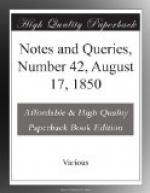It seems uncertain whether Newes was considered by our ancestors plural or singular. Resolute John Florio is sadly inconsistent in his use of it: in his World of Wordes, ed. 1598, we have:
“Nova, newe, fresh, a noueltie, a newe report.
“Novella, a tale,
a nouell, a noueltie, a discourse, a newes
a message.”
In Queen Anna’s World of Wordes, 1611:
“Nova, a noueltie, a new report.
“Novella, a tiding, or newes.
“Novellante, a teller of newes or tidings.”
Here we have newes treated both as singular and plural! while we have tiding as the singular of tidings, a form which, from long disuse, would now appear strange to us. In the following extract from Florio’s very amusing book of Dialogues, Second Frutes, 1591, he makes newes decidedly plural:—
“C. What doo they say abroade? what newes have you, Master Tiberio? T. Nothing that I know; can you tell whether the post be come? C. No, Sir; they saye in the Exchange that the great Turke makes great preparation to warre with the Persian. T. ’Tis but a deuice; these be newes cast abroade to feede the common sorte, I doo not beleeue them.... C. Yea, but they are written to verie worshipful merchants. T. By so much the lesse doo I beleeue them; doo not you know that euerie yeare such newes are spreade abroade? C. I am almost of your minde, for I seldome see these written reports prove true. T. Prognostications, newes, deuices, and letters from forraine countries (good Master Caesar), are but used as confections to feed the common people withal. C. A man must give no more credite to Exchange and Powles’ newes than to fugitiues promises and plaiers fables.”
In Thomas’s Principal Rules of the Italian Grammer, with a Dictionarie, printed by Thomas Powell in 1562, but written in 1548, we have—
“Novella, a tale, a parable, or a neweltee.
“Novelluzza, an ynkelyng.
“Novellare, to tell tales or newes.”
In the title page of a rare little volume printed in 1616, we have the adjective new in apposition with the substantive newes, thus:
“Sir Thomas Overburie his Wife, with new Elegies upon his (now knowne) untimely death. Whereunto are annexed New Newes and Characters written by himselfe and other learned Gentlemen. Editio septima. London: printed by Edward Griffin for Lawrence Lisle, 1616, 12mo.”
The head of one section is— {181}
“Newes from any-whence,
or, Old Truth under a supposal of
Noueltie.”




